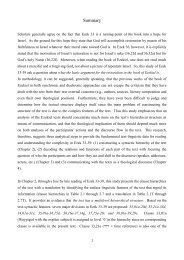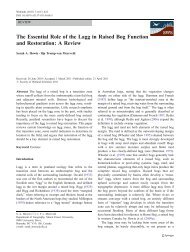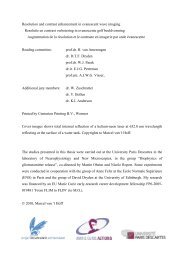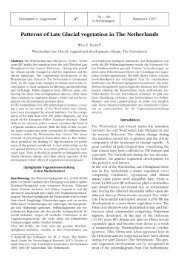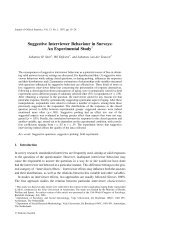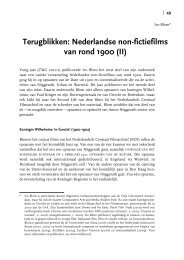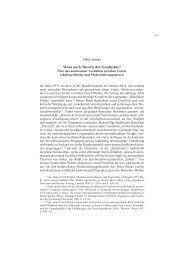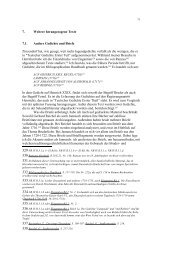- Page 1 and 2:
Barbara van Caem-Posch Buurtregie m
- Page 3 and 4:
Omslagontwerp: Primo!Studio, Delft
- Page 5 and 6:
promotor: prof.dr. J.C.J. Boutellie
- Page 7 and 8:
Buurtregie met mate 5 Regisseren va
- Page 9 and 10:
Buurtregie met mate Bijlagen 355 Bi
- Page 11 and 12:
Buurtregie met mate Dan wil ik alle
- Page 13 and 14:
Buurtregie met mate gaat de behoeft
- Page 15 and 16:
Buurtregie met mate model geeft voo
- Page 17 and 18:
Buurtregie met mate Deel twee Deel
- Page 20 and 21:
2 Community policing In dit hoofdst
- Page 22 and 23:
2 Community policing politiewerk. H
- Page 24 and 25:
2 Community policing Weick, Meyer e
- Page 26 and 27:
2 Community policing geïsoleerd di
- Page 28 and 29:
2 Community policing discretionaire
- Page 30 and 31:
2 Community policing Concluderend i
- Page 32 and 33:
2 Community policing functioneren v
- Page 34 and 35:
2 Community policing echter vooral
- Page 36 and 37:
2 Community policing en Terpstra da
- Page 38 and 39:
2 Community policing waardevol voor
- Page 40 and 41:
2 Community policing eigen doelen b
- Page 42 and 43:
2 Community policing commitment zow
- Page 44 and 45:
2 Community policing een reeks vrij
- Page 46 and 47:
2 Community policing van overlast,
- Page 48:
2 Community policing oriëntatie do
- Page 51 and 52:
Buurtregie met mate normen en waard
- Page 53 and 54:
Buurtregie met mate beslissing tot
- Page 55 and 56:
Buurtregie met mate De projectgroep
- Page 57 and 58:
Buurtregie met mate rijkspolitie we
- Page 59 and 60:
Buurtregie met mate 3.6 De opkomst
- Page 61 and 62:
Buurtregie met mate overheid en een
- Page 63 and 64:
Buurtregie met mate 3.7 Integrale v
- Page 65 and 66:
Buurtregie met mate Cachet en Ringe
- Page 67 and 68:
Buurtregie met mate het algemeen be
- Page 69 and 70:
Buurtregie met mate onderlinge want
- Page 71 and 72:
Buurtregie met mate het informatieg
- Page 73 and 74:
Buurtregie met mate prestatiedruk,
- Page 75 and 76:
Buurtregie met mate Een tweede kenm
- Page 77 and 78:
Buurtregie met mate Wat betreft het
- Page 79 and 80:
Buurtregie met mate van de toestroo
- Page 81 and 82:
Buurtregie met mate lokaal niveau v
- Page 83 and 84:
Buurtregie met mate Ten slotte is d
- Page 85 and 86:
Buurtregie met mate onder de spreke
- Page 87 and 88:
Buurtregie met mate 4.2.1 De functi
- Page 89 and 90:
Buurtregie met mate niet tot hotspo
- Page 91 and 92:
Buurtregie met mate voor leefbaarhe
- Page 93 and 94:
Buurtregie met mate buurtregisseur
- Page 95 and 96:
Buurtregie met mate 4.3.4 Capacitei
- Page 97 and 98:
Buurtregie met mate vliegende briga
- Page 99 and 100:
Buurtregie met mate daarmee de same
- Page 101 and 102:
Buurtregie met mate en leefbaarheid
- Page 103 and 104:
Buurtregie met mate stijgend crimin
- Page 105 and 106:
Buurtregie met mate om ons subjecti
- Page 107 and 108:
Buurtregie met mate tot andere groe
- Page 109 and 110:
Buurtregie met mate de symboolfunct
- Page 111 and 112:
Buurtregie met mate Idealiter ziet
- Page 113 and 114:
Buurtregie met mate Het model van n
- Page 115 and 116:
Buurtregie met mate Distantie: inte
- Page 117 and 118:
Buurtregie met mate 4. Leiding geve
- Page 119 and 120:
Buurtregie met mate Nabijheid: bred
- Page 121 and 122:
Buurtregie met mate Distantie: bepe
- Page 123 and 124:
Buurtregie met mate 122 aanpakken v
- Page 126 and 127:
6 Onderzoeksmethode 6.1 Keuze voor
- Page 128 and 129:
6 Onderzoeksmethode is daar nog ste
- Page 130 and 131:
6 Onderzoeksmethode heidsindex van
- Page 132 and 133:
6 Onderzoeksmethode heeft altijd in
- Page 134 and 135:
6 Onderzoeksmethode Bij vergelijkin
- Page 136 and 137:
6 Onderzoeksmethode interpreteren.
- Page 138 and 139:
6 Onderzoeksmethode de interpretati
- Page 140 and 141:
6 Onderzoeksmethode ook de achtergr
- Page 142 and 143:
6 Onderzoeksmethode op te geven. Ee
- Page 144:
DEEL II KIJK OP BUURTREGIE
- Page 147 and 148:
Buurtregie met mate opschalingsmode
- Page 149 and 150:
Buurtregie met mate en het delen va
- Page 151 and 152:
Buurtregie met mate eveneens aan da
- Page 153 and 154:
Buurtregie met mate Een andere groe
- Page 155 and 156:
Buurtregie met mate Wijkteamchefs v
- Page 157 and 158:
Buurtregie met mate in georganiseer
- Page 159 and 160:
Buurtregie met mate eventuele volge
- Page 161 and 162:
Buurtregie met mate In het kader va
- Page 163 and 164:
Buurtregie met mate de gewenste han
- Page 165 and 166:
Buurtregie met mate 164 van de vele
- Page 167 and 168:
Buurtregie met mate 166 flink wat g
- Page 169 and 170:
Buurtregie met mate In het geval va
- Page 171 and 172:
Buurtregie met mate Gevraagd naar d
- Page 173 and 174:
Buurtregie met mate Resumé toolbox
- Page 175 and 176:
Buurtregie met mate tonen concentra
- Page 177 and 178:
Wijkteamchefs zien in de relatie po
- Page 179 and 180:
Buurtregie met mate Het ene door bu
- Page 181 and 182:
Buurtregie met mate over het algeme
- Page 183 and 184:
Buurtregie met mate 182 ‘Sommige
- Page 185 and 186:
Buurtregie met mate Kennen en geken
- Page 187 and 188:
Buurtregie met mate Eén buurtregis
- Page 189 and 190:
Buurtregie met mate kaanse gemeensc
- Page 191 and 192:
Buurtregie met mate 190 ‘Als een
- Page 193 and 194:
Buurtregie met mate Sommige buurtre
- Page 195 and 196:
Buurtregie met mate oplossingen wer
- Page 197 and 198:
Buurtregie met mate probleem kan bl
- Page 199 and 200:
Buurtregie met mate beslisruimte aa
- Page 201 and 202:
Buurtregie met mate informeel en in
- Page 203 and 204:
Buurtregie met mate 202 ‘Deze wij
- Page 205 and 206:
Buurtregie met mate wat het contact
- Page 207 and 208:
Buurtregie met mate 206 hij zelf to
- Page 209 and 210:
Buurtregie met mate waar kunnen mak
- Page 211 and 212:
Buurtregie met mate Uitzonderingen
- Page 213 and 214:
Buurtregie met mate Daarnaast hante
- Page 215 and 216:
Buurtregie met mate 214 contact te
- Page 217 and 218:
Buurtregie met mate Een minderheid
- Page 219 and 220:
Buurtregie met mate 218 ‘Ik stond
- Page 221 and 222:
Buurtregie met mate 220 ‘De korps
- Page 223 and 224:
Buurtregie met mate zou komen: redu
- Page 225 and 226:
Buurtregie met mate Tabel 5: Buurtr
- Page 227 and 228:
Buurtregie met mate haar te halen.
- Page 229 and 230:
Buurtregie met mate 228 van prevent
- Page 231 and 232:
Buurtregie met mate 230 vind ik zee
- Page 233 and 234:
Buurtregie met mate zien dat eraan
- Page 235 and 236:
Buurtregie met mate de politie blij
- Page 238 and 239:
10 Perceptie actieve burgers Dit ho
- Page 240 and 241:
10 Perceptie actieve burgers ‘G:
- Page 242 and 243:
10 Perceptie actieve burgers contac
- Page 244 and 245:
10 Perceptie actieve burgers waarbi
- Page 246 and 247:
10 Perceptie actieve burgers stelen
- Page 248 and 249:
10 Perceptie actieve burgers afneme
- Page 250 and 251:
10 Perceptie actieve burgers ‘Beg
- Page 252 and 253:
10 Perceptie actieve burgers ten ko
- Page 254 and 255:
10 Perceptie actieve burgers ‘Per
- Page 256 and 257:
10 Perceptie actieve burgers of mee
- Page 258 and 259:
10 Perceptie actieve burgers Resume
- Page 260 and 261:
10 Perceptie actieve burgers de ver
- Page 262 and 263:
10 Perceptie actieve burgers ‘Enk
- Page 264 and 265:
10 Perceptie actieve burgers Respon
- Page 266 and 267:
11 Perceptie sleutelpersonen Dit ho
- Page 268 and 269:
11 Perceptie sleutelpersonen heb mo
- Page 270 and 271:
11 Perceptie sleutelpersonen de pol
- Page 272 and 273:
11 Perceptie sleutelpersonen Sleute
- Page 274 and 275:
11 Perceptie sleutelpersonen deze l
- Page 276 and 277:
11 Perceptie sleutelpersonen en om
- Page 278 and 279:
11 Perceptie sleutelpersonen activi
- Page 280 and 281:
11 Perceptie sleutelpersonen tafel
- Page 282 and 283:
Resumé bepalen van de aanpak 11 Pe
- Page 284 and 285:
11 Perceptie sleutelpersonen politi
- Page 286 and 287:
11 Perceptie sleutelpersonen Een ru
- Page 288 and 289:
11 Perceptie sleutelpersonen zijn t
- Page 290 and 291:
11 Perceptie sleutelpersonen politi
- Page 292 and 293:
11 Perceptie sleutelpersonen de pol
- Page 294:
DEEL III REFLECTIE EN EINDBALANS
- Page 297 and 298: Buurtregie met mate 12.1 Het streve
- Page 299 and 300: Buurtregie met mate Figuur 2: Nabij
- Page 301 and 302: Buurtregie met mate de adviezen die
- Page 303 and 304: Buurtregie met mate Resumé laagdre
- Page 305 and 306: Buurtregie met mate Wijkteamchefs e
- Page 307 and 308: Buurtregie met mate buurt tijdens h
- Page 309 and 310: Buurtregie met mate gedachte gang d
- Page 311 and 312: Buurtregie met mate speelt is dat o
- Page 313 and 314: Buurtregie met mate De buurtregisse
- Page 315 and 316: Buurtregie met mate molenmeester en
- Page 317 and 318: Buurtregie met mate willen (ver)hel
- Page 319 and 320: Buurtregie met mate keuzes maken ov
- Page 321 and 322: Buurtregie met mate Verbetervoorste
- Page 323 and 324: Buurtregie met mate Uit dit onderzo
- Page 325 and 326: Buurtregie met mate collectief burg
- Page 327 and 328: Buurtregie met mate nabijheid tot b
- Page 329 and 330: Buurtregie met mate toont aan dat z
- Page 331 and 332: Buurtregie met mate 2010: 198). Een
- Page 333 and 334: Buurtregie met mate belangrijk dat
- Page 336: Nawoord Ondanks de tekortkomingen t
- Page 339 and 340: Buurtregie met mate Western countri
- Page 341 and 342: Buurtregie met mate rank, a substan
- Page 343 and 344: Buurtregie met mate Some neighbourh
- Page 345 and 346: Buurtregie met mate is a real possi
- Page 347: Buurtregie met mate Bron, R., Duijn
- Page 351 and 352: Buurtregie met mate praktijk. Gebru
- Page 353 and 354: Buurtregie met mate Hageman, H., Co
- Page 355 and 356: Buurtregie met mate www.eigen-krach
- Page 358 and 359: Bijlage 1 Interviewformat politie 6
- Page 360 and 361: Bijlage 2 Interviewformat niet-poli
- Page 362: Bijlagen 9. Weet u van acties in uw
- Page 365 and 366: Buurtregie met mate Tabel 11: Actie
- Page 367 and 368: Buurtregie met mate Tabel 14: Bevol
- Page 370 and 371: Bijlage 5 Veiligheidsindexen buurtc
- Page 372 and 373: Bijlage 6 Criminogene factoren buur
- Page 374: Hoewel door het invoeren van commun







